Choosing the perfect Gothic girl names can be a daunting task, especially when you want something that embodies dark elegance, mystery, and feminine sophistication. Many parents and writers seek unique Gothic names that reflect Gothic culture, alternative style inspiration, and a sense of timeless beauty. Our comprehensive list of 150+ Dark Elegant Female Gothic Names & Meanings offers the perfect blend of elegant female names and mysterious girl names to suit a variety of tastes and personalities.
Every name on this list is accompanied by its meaning and mystical origins, providing insight into the symbolic meanings and powerful names that resonate with Gothic aesthetics. From fantasy girl names to dark and mystical names, each choice is crafted to reflect dark beauty, Gothic-inspired names, and a sense of Gothic identity. Whether you’re naming a character, a baby, or looking for alternative girl names, this guide ensures you find something unique, enchanting, and meaningful.
Explore our selection of Gothic baby names, Gothic first names, and Gothic character names to discover the perfect balance of elegance and mystery. These dark elegance-infused names capture timeless Gothic names that can inspire creativity and provide a deep connection to Gothic style names. With mysterious meanings and powerful symbolic significance, every name is designed to celebrate dark beauty and feminine elegance, helping you find a truly unique name idea that fits perfectly within the Gothic aesthetic.
What Makes a Name Gothic? (Meaning, Mood & Aesthetic Explained)
A Gothic name is more than just a label—it embodies a rich Gothic aesthetic and reflects a sense of dark elegance that resonates with Gothic femininity and mysterious charm. Rooted in Gothic style meaning and Gothic heritage, these names often draw inspiration from ancient influences, historical roots, and Gothic traditions, giving them a timeless and enchanting quality. Choosing a name with symbolic significance allows it to convey both emotional resonance and personality reflection, creating a strong sense of Gothic identity for anyone who bears it.
The allure of a Gothic name lies in its ability to balance dark beauty with mystical origins, evoking a mood of intrigue and elegance. Many Gothic-inspired names are shaped by themes of darkness, elegance, and mystique, capturing the essence of alternative style while remaining meaningful and unique. Whether for storytelling, character creation, or naming a child, these names carry enchanting qualities and a unique identity, perfectly reflecting the Gothic mood and tone that has fascinated generations.
By understanding the Gothic aesthetic, its symbolism, and the cultural significance behind each name, you can appreciate how a Gothic name becomes more than a word—it is a statement of style, identity, and timeless dark elegance.
Key Elements of Gothic Names
1. Dark Names: Names that evoke mystery, the supernatural, dark feminine energy, or tragic beauty—core traits found in gothic girl names and dark aesthetic names.
2. Elegant Names: Sophisticated, ethereal, and graceful choices with subtle gothic allure, perfect for creating an elegant dark feminine vibe.
3. Literary & Mythological Inspirations: Names drawn from gothic literature, mythology, classic dark folklore, and ancient legends, giving them timeless narrative depth.
4. Symbolism & Nature Elements: Inspired by the moon, night, shadows, ravens, thorns, storm symbolism, and other dark nature-inspired names—a major trend in modern gothic naming.
5. Modern Minimalist Gothic Style: Short, sharp names with sleek modern gothic energy, including one-syllable gothic names like Lux, Nox, Vex, and Rune, reflecting today’s minimalist dark aesthetic.
6. Occult & Esoteric Influences: Names rooted in witchcraft, runes, occult symbolism, celestial magic, and esoteric meanings, aligning with the rise of witchy gothic girl names in modern culture.
Female Gothic Names Inspired by Night & Darkness
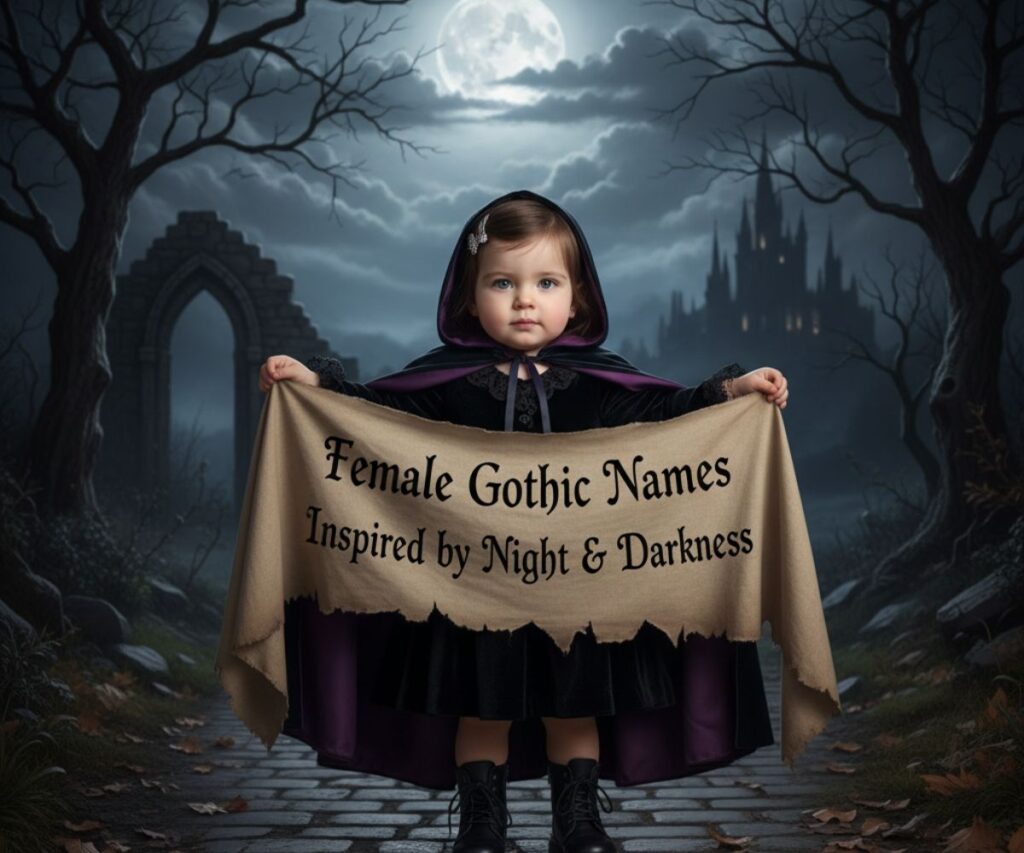
Darkness has always carried a magnetic pull—an ancient, poetic force that shapes myth, literature, and identity. Dark gothic girl names inspired by night, shadow, and mystery hold a timeless elegance, making them perfect for characters who embody depth, power, and quiet intensity. Names born from twilight imagery naturally evoke cosmic darkness, hidden realms, and ethereal femininity, helping writers and parents craft identities wrapped in allure. Whether you’re building a fantasy world, developing a supernatural character, or simply seeking names meaning night or darkness, this curated list brings together mythological origins, historical depth, and modern dark beauty. Each name below resonates with themes of gothic mystique, moonlit symbolism, and the profound silence of the night.
Names Meaning “Night” or “Darkness”
Below is an extensive list of female gothic names tied to darkness, night, shadows, and ancient myths—each with meaning, origin, and tone.
- Branwen (Welsh) – Interpreted as “beautiful raven”; tied to black birds, omens, and gothic symbolism.
- Duvessa (Irish) – “Dark beauty”; rare and perfect for gothic fantasy settings.
- Erebus / Erebia (Greek) – Primordial deity of darkness; the feminized form “Erebia” feels rare and powerfully gothic.
- Keira (Irish) – Derived from “Ciara,” meaning “little dark one.”
- Layla (Arabic) – Means “night”; carries romantic, poetic darkness with Middle Eastern charm.
- Lilith (Hebrew/Mesopotamian) – Associated with the night, rebellion, seduction, and independence; a classic among dark feminine names.
- Melanie (Greek) – Means “black, dark”; a familiar name with subtle shadow undertones.
- Melantha (Greek) – “Dark flower”; a poetic and gothic botanical name.
- Morrigan (Irish) – War goddess associated with night, ravens, and shadowed prophecy.
- Morwen (Welsh) – “Dark maiden”; a literary gothic name with Tolkien-inspired allure.
- Nisha (Sanskrit) – “Night”; beautifully soft yet mysterious.
- Nyx (Greek) – Primordial goddess of night; represents cosmic darkness, mystic power, and ancient shadow energy.
- Obscura (Latin) – “Dark, hidden”; ideal for characters associated with secrecy or arcane knowledge.
- Sauda (Arabic) – Means “dark, black”; carries regal gothic elegance.
- Tamsin (English) – Sometimes associated with “twin of the night” in gothic fiction.
- Tenebrae (Latin) – “Darkness, shadows”; rich ecclesiastical gothic tone.
- Umbra (Latin) – Means “shadow”; evokes scientific mystique and elegant obscurity.
- Zuleika (Arabic/Persian) – Interpreted as “brilliant, dark beauty”; exotic and mysterious.
Names Meaning “Shadow” or “Eclipse”
A collection of shadow names, eclipse-inspired names, and rare gothic girl names connected to dimness, silhouettes, and obscurity:
- Calista / Kalista (Greek) – In some esoteric contexts linked to eclipse symbolism; elegant celestial name.
- Chhaya (Sanskrit) – “Shadow, reflection”; soft and feminine.
- Duska (Slavic) – Connected to “dusk”; gentle twilight darkness.
- Eclissa (Italian/Latin-rooted) – Stylized form inspired by “eclipse,” ideal for astral gothic names.
- Kage (Japanese) – Means “shadow”; minimal, modern, and sleek.
- Nox (Latin) – Personification of night shadows; sharp, powerful, and darkly feminine.
- Ravenna (Italian) – Implies raven-like darkness and shadowy beauty.
- Shayla (Gaelic) – Sometimes interpreted as “from the fairy palace of shadows.”
- Sombra (Spanish) – “Shadow”; soft, romantic darkness with Iberian flair.
- Umeko (Japanese) – “Plum blossom child,” but often poetically linked to night shadows in literature.
- Zillah (Hebrew) – Means “shade, shadow”; vintage biblical gothic rarity.
Moon Goddess Names with Dark Undertones
The moon has always shaped gothic mythology with its cycles, eerie glow, and nocturnal presence. These moon goddess names carry both celestial beauty and shadowy undertones—perfect for mystical gothic girl names:
- Artemis (Greek) – Huntress of the wilderness and night; embodies independence and lunar shadow.
- Diana (Roman) – Roman counterpart of Artemis; timeless, elegant, and guided by moonlit strength.
- Hecate (Greek) – Goddess of witchcraft, crossroads, and the dark moon; one of the most powerful names in gothic mythology.
- Luna (Roman) – Moon deity; symbolizes emotional depth and quiet, ethereal beauty.
- Selene (Greek) – Moon goddess; evokes pale luminosity mixed with sacred mystery.
Elegant Gothic Girls Names with Victorian & Classic Influence
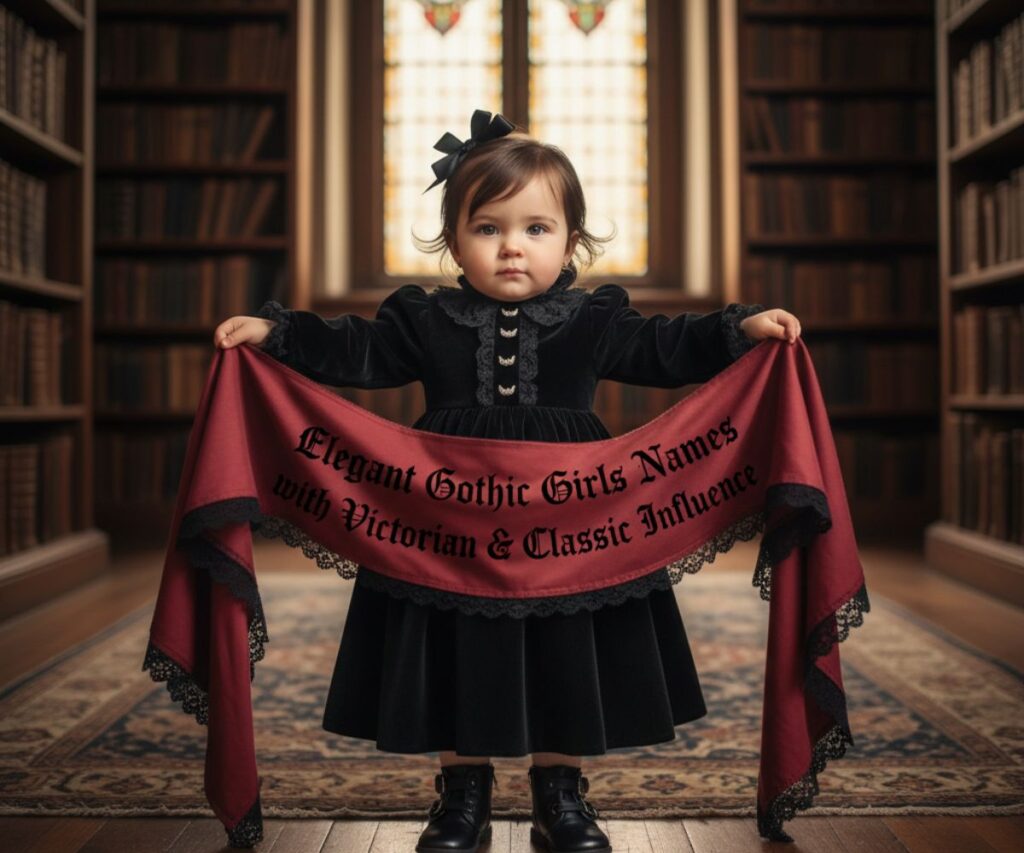
The Victorian era remains one of the richest sources of elegant gothic names, blending aristocratic refinement with a haunting sense of beauty. This period embraced gothic romanticism, tragic heroines, and poetic melancholy—making its naming style ideal for characters or children who embody sophistication wrapped in darkness. Victorian gothic girl names often merge classical mythology, medieval legends, and literary symbolism, resulting in identities with depth and emotional resonance. These names evoke candlelit ballrooms, moonlit gardens, and grand libraries full of secrets. Perfect for writers, roleplayers, or parents seeking refined dark names with a touch of mystery, the list below brings together the era’s most atmospheric, timeless, and beautifully somber options.
Victorian-Era Gothic Names
Below is a curated collection of Victorian gothic girl names that express elegance, aristocracy, and shadowed romanticism:
- Adelaide (Germanic) – “Noble natured”; quintessential vintage aristocracy.
- Agatha (Greek) – “Good, honorable”; darkly iconic through Agatha Christie’s mysteries.
- Anneliese (German) – Refined European name suited for dark romantic settings.
- Arabella (Latin) – “Yielding to prayer”; Victorian high-society elegance with gothic softness.
- Beatrice (Latin) – “She who brings happiness”; Dante’s guide through a dark spiritual journey.
- Cecilia (Latin) – Patron saint of music; associated with eloquence and Victorian grace.
- Clarissa (Latin) – “Bright, clear”; beloved Victorian favorite with gothic undertones.
- Cordelia (Celtic/Latin) – “Heart, daughter of the sea”; King Lear’s noble, sorrowful heroine.
- Eleanora (Greek) – Noble, luminous; often tied to poetic and gothic Victorian heroines.
- Evangeline (Greek) – “Bearer of good news”; Victorian tragedy and romance combined.
- Francesca (Latin) – “Free one”; romantic, dramatic, and softly gothic.
- Genevieve (Germanic) – “Tribe woman”; refined French medieval elegance.
- Helena (Greek) – “Bright, shining”; Victorian grace with dramatic undercurrents.
- Henrietta (Germanic) – “Home ruler”; aristocratic Victorian elegance.
- Isolde (Celtic) – Tragic heroine of legend associated with haunting romance.
- Lavinia (Latin) – Ancient Roman name revived in Victorian times; refined, melancholic beauty.
- Lenora (Greek/English) – “Light”; a Poe-inspired classic tied to gothic poetry.
- Maribel (French/Latin) – Combination of Mary and Belle; vintage sweetness with shadowy Victorian charm.
- Marjorie (Greek) – Derived from Margaret; vintage charm and literary presence.
- Ophelia (Greek) – “Help, aid”; a Shakespearean tragic figure and symbol of doomed beauty.
- Rosamund (Germanic) – “Horse protection” or “rose of the world”; medieval-Victorian fusion with dark floral energy.
- Rowena (Anglo-Saxon) – “Fame and happiness”; a dignified medieval and Victorian choice.
- Seraphine (Hebrew/French) – “Fiery, burning ones”; angelic yet darkly ethereal.
- Vivienne (Latin) – “Alive, lively”; carries Arthurian mystique and feminine charm.
- Winifred (Welsh) – “Blessed peacemaker”; evokes classic, somber nobility.
Names from Gothic Literature & Classic Horror
Classic horror and gothic literature offer some of the most iconic dark feminine names. These literary gothic girl names carry deep cultural resonance, tragedy, and a haunting allure—perfect for storytelling:
- Carmilla – From Sheridan Le Fanu’s vampire novella; seductive, eerie, and foundational to gothic horror.
- Christabel – From Coleridge’s poem; soft, lyrical, and filled with supernatural ambiguity.
- Clarimonde – From La Morte Amoureuse; mysterious, beautiful, and immortal.
- Ligeia – One of Poe’s most haunting heroines; mystical, intellectual, and otherworldly.
- Lucy – From Bram Stoker’s Dracula; symbolic of innocence transformed by darkness.
- Mina – Another Dracula classic; resilient, intelligent, and emotionally complex.
- Rowena – Featured in Poe’s tales; steeped in melancholy and gothic romanticism.
Aristocratic Vintage Names with Dark Elegance
Inspired by Victorian estates, noble lineages, and gothic architecture, these aristocratic gothic names use the surname-as-first-name trend to create dignified yet shadowy identities:
- Ashford – Refined and stately, with a subtle charcoal-dark tone.
- Blackwood – Suggests mystery, forests, and old bloodlines; perfect for dark elegance.
- Everly – Vintage aristocracy with soft romantic gloom.
- Harrow – Dramatic and haunting; ideal for gothic characters.
- Hawthorne – Literary and botanical darkness intertwined.
- Kingsley – Regal, polished, and suitable for gothic nobility.
- Ravencroft – Evokes ravens, ancient manors, and mist-covered estates.
- Thornbury – Sharp, botanical, and classically Victorian.
Witchy Female Gothic Names for Magical & Mystical Characters
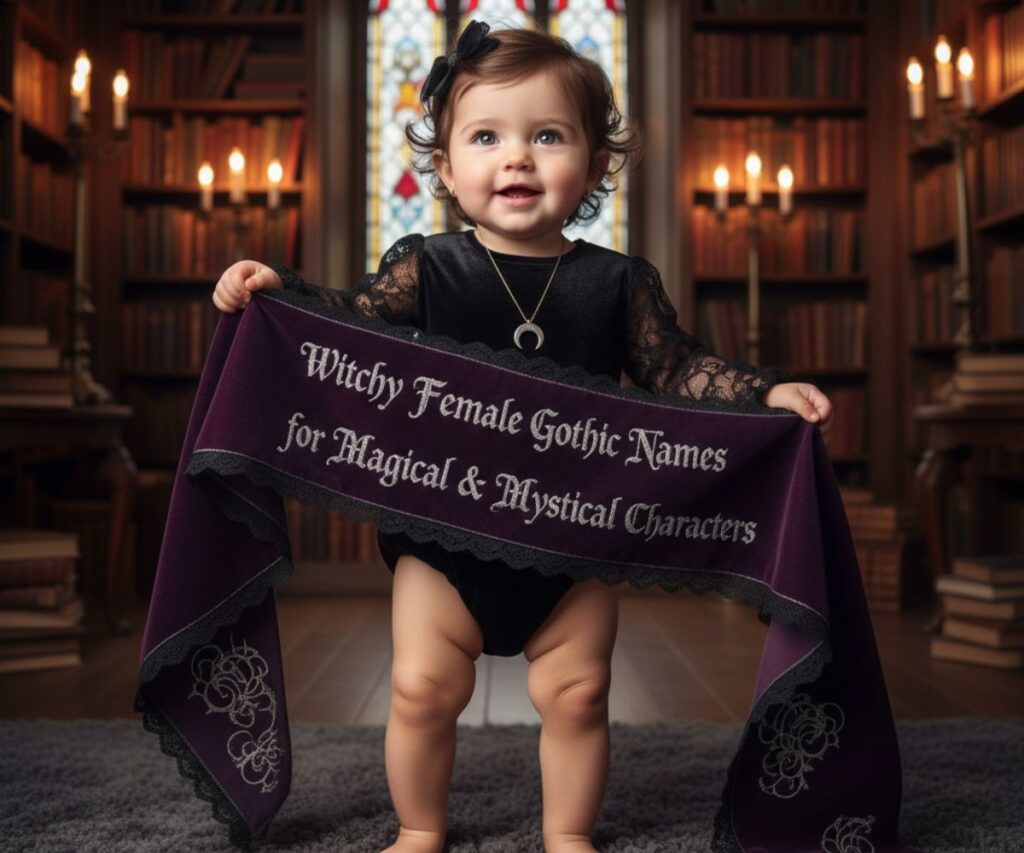
Witchcraft and gothic aesthetics have always shared a deeply intertwined bond—both rooted in moonlit forests, arcane symbols, and the unseen threads of fate. Witchy gothic girl names embody this connection by blending dark mystique with ethereal femininity. These names conjure visions of spell-casting, ancient rituals, shadowy familiars, and secrets whispered beneath the full moon. Whether you’re crafting a fantasy heroine, shaping a Wiccan identity, or building a mystical persona, magical dark names offer the perfect balance of enchantment and gothic depth. Inspired by folklore, occult traditions, and legendary sorceresses, the following list brings together names that feel powerful, otherworldly, and uniquely atmospheric—ideal for those who walk between the worlds of magic and shadow.
Names of Historical Witches & Sorceresses
Below is a carefully curated collection of witch-inspired gothic names and enchanted feminine names rooted in myth, folklore, and magical history:
- Aradia (Italian) – Known as the goddess of witches in Italian pagan folklore.
- Arianrhod (Welsh) – Goddess of fate and the moon; deeply mystical.
- Bellatrix (Latin) – “Female warrior”; star name with strong dark-witch associations.
- Cassandra (Greek) – Cursed prophetess with tragic clairvoyance.
- Circe (Greek) – Enchantress of the Odyssey; master of transformation spells.
- Elspeth (Scottish) – “Pledged to God”; tied to Scottish witch trials and folk magic.
- Endora (Greek) – Legendary witch name tied to classic fantasy and pop culture.
- Hilda (Germanic) – Popular witch name via Sabrina the Teenage Witch.
- Isidora (Greek) – “Gift of Isis”; linked to Egyptian magic and goddess worship.
- Medea (Greek) – “Cunning, planning”; famous for dark magic and tragic vengeance.
- Minerva (Latin) – Roman goddess of wisdom and magic; Hogwarts also boosted its gothic presence.
- Morgana (Welsh) – “Sea-born”; Morgan le Fay, the iconic Arthurian sorceress.
- Orenda (Native American) – Represents spiritual power and mystical energy.
- Rowena (Germanic/English) – Linked in medieval texts to enchantment and witchcraft.
- Sabina (Latin) – Connected to ancient rites and pagan traditions.
- Sybil (Greek) – “Prophetess”; evokes oracles, divination, and mystical foresight.
- Tituba (Caribbean/Indigenous) – Historical Salem witch trial figure.
- Zelda (Yiddish) – “Blessed”; beloved for its occult vintage charm.
Names Meaning “Magic,” “Spell,” or “Enchantment”
These mystical gothic girl names and occult feminine names directly echo themes of magic, sorcery, and supernatural power:
- Althea – Means “healer,” tied to magical herbalism and mystical remedies.
- Enchantia – Whimsical name meaning “enchantment” or “enchanted realm.”
- Esmeralda – Linked to emeralds, enchantment, and spellbinding beauty.
- Faye – Means “fairy, enchantment”; soft yet powerful gothic magic.
- Merlina – Feminized form of Merlin; evokes legendary wizardry.
- Rune – Associated with ancient symbols and divinatory magic.
- Saga – Old Norse for “story” or “seeress”; mystical and prophetic.
- Soraya – Linked to celestial magic and astral symbolism.
- Spellwyn – Stylized gothic name suggesting spell-craft and magical artistry.
Herbology & Potion-Inspired Gothic Names
These dark botanical names originate from poisonous plants, ancient herbal lore, and potion-making traditions—perfect for witchy characters, herbalists, or dark academia personas:
- Belladonna – Deadly nightshade; beautiful but dangerous, tied to witchcraft and dark magic.
- Foxglove – Tall, elegant flower; associated with fae magic and potent toxins.
- Hemlock – Symbol of poison, fate, and grave witchcraft.
- Henbane – Historic witch herb used in potions and flying ointments.
- Mandrake – Mythic root connected to screaming folklore and dark magic rituals.
- Nightshade – Quintessential witchy gothic name with deadly charm.
- Wolfsbane – Poisonous herb linked to werewolf mythology and ancient protection spells.
- Yarrow – Herb of healing, divination, and ritual protection.
Note: These plant names are primarily symbolic for fantasy writing and should not be used literally for real-life consumption or handling.
Mythology-Inspired Female Gothic Names for Dark Feminine Energy
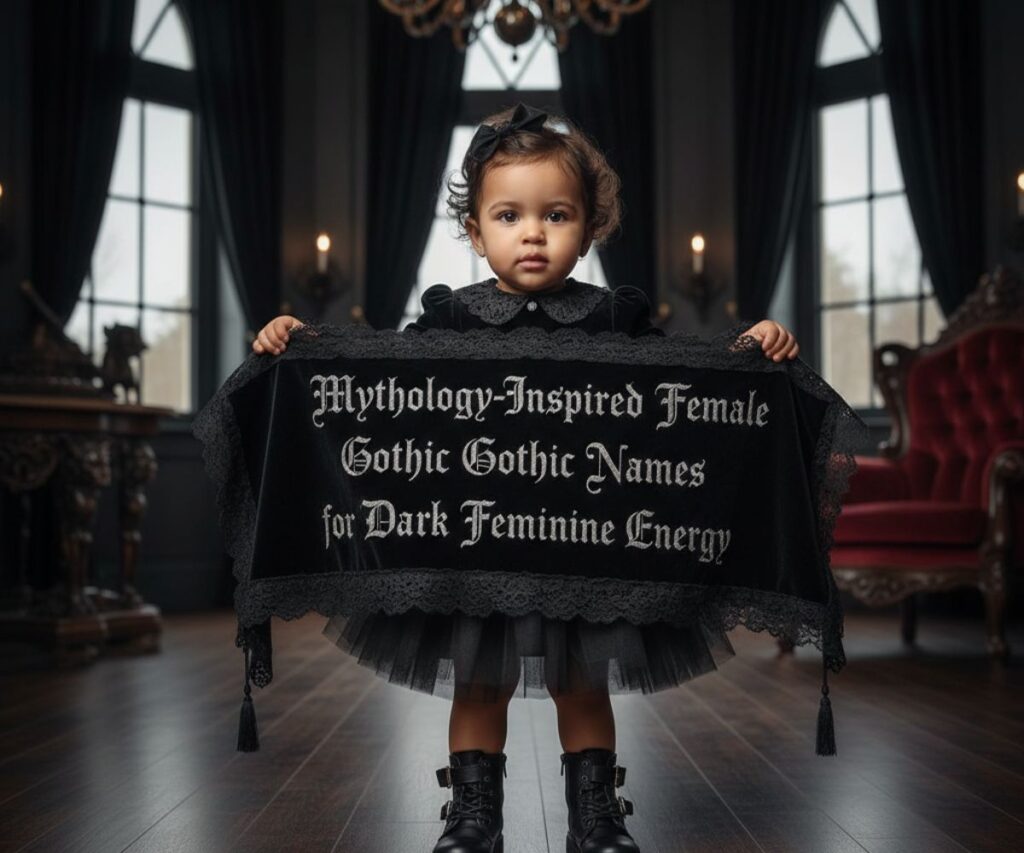
Ancient mythology has always been one of the richest wells for mythology gothic names, offering figures who embody darkness, power, rebirth, and the mysteries of the unseen world. Across cultures, dark goddess names reveal archetypes connected to death, night, the underworld, and transformation—timeless symbols that continue to inspire modern gothic, fantasy, and occult naming trends. From Greek primordial forces to Norse warrior spirits and Celtic death queens, these mythic identities carry deep symbolism and atmospheric gravitas. Whether you’re crafting a character, building a mystical persona, or exploring spiritual archetypes, gothic mythology girl names provide an intense, shadowed beauty rooted in ancient lore. Below is a collection of powerful, enigmatic names perfect for anyone seeking dark feminine energy with mythic authority.
Greek Mythology’s Dark Goddesses
Greek myths offer some of the most iconic dark feminine archetypes, making them perfect for myth-inspired gothic names. Each name carries ancient power, shadowed mystique, and cosmic or underworld associations:
- Achlys – Primordial goddess of eternal night and misery; embodies ancient shadow energy.
- Allecto – One of the Furies; represents relentless rage, punishment, and dark vengeance.
- Atropos – Fate who cuts life’s thread; symbolizes mortality and inevitability.
- Eris – Goddess of strife; chaotic, unpredictable feminine power.
- Hecate – Goddess of witchcraft, necromancy, and crossroads; triple-formed deity of dark magic.
- Hemera (Dark Aspect) – Day goddess with shadow contrast to Nyx; embodies dualistic light and dark.
- Keres – Female death spirits; personify violent battlefield death.
- Lampade – Underworld torchbearers; companions of Hecate, symbolizing guiding shadows.
- Melinoë – Underworld nymph associated with ghosts, madness, and spectral presence.
- Moira – Meaning “fate”; echoes destiny, cosmic order, and inevitable outcomes.
- Nemesis – Goddess of retribution; embodies divine justice and cold, balanced vengeance.
- Nyx – Primordial goddess of night; cosmic darkness and mystic shadow power.
- Persephone – Queen of the Underworld; death and rebirth, seasonal transformation, underworld royalty.
- Thaniná – Feminine take on Thanatos; symbolic of peaceful death and quiet darkness.
- Styx – Personification of the underworld river; boundary between life and death, mystical passage.
Norse Mythology’s Fierce Feminine Names
Norse mythology is a treasure trove of dark warrior names and gothic mythology girl names, shaped by ice, battle, fate, and feminine power. These names evoke strength, mystique, and gothic elegance:
- Brunhilde – “Armored warrior woman”; legendary Valkyrie queen with battlefield prestige.
- Eir – Goddess of healing magic; quiet yet powerful presence in Norse lore.
- Freyja – Goddess of love and death; receives half of the slain warriors, combining beauty and danger.
- Gunnr – Means “war”; embodies fierce warrior spirit and battle energy.
- Hildr – Means “battle”; a Valkyrie who enchants war, symbolizing combat and mystical power.
- Kára – Valkyrie name meaning “wild, stormy one”; evokes untamed feminine force.
- Róta – A Valkyrie whose name means “sleet” or “tumult”; tied to chaotic winter battles.
- Skadi – Winter goddess of vengeance, hunting, and icy wilderness; embodies cold power.
- Skuld – One of the Norns; linked to future, destiny, and inevitable fate.
- Sigrun – “Victory rune”; Valkyrie associated with battlefield fate and triumph.
- Solveig (Dark Interpretation) – “Sun strength”; used in gothic Nordic contexts for contrast, mystical tone.
- Hel – Ruler of the underworld; half-alive, half-dead figure of chilling gothic beauty.
Egyptian, Roman & Celtic Dark Deities
These cultures offer some of the most powerful dark goddess names in the mythic world. Each name embodies shadow, death, fate, and mystical feminine energy, perfect for gothic character naming:
- Anubette (Modern Feminine) – Inspired by Anubis; creative gothic mythology name meaning “death guide.”
- Arianrhod (Welsh/Celtic) – Goddess of fate, cycles, and moon magic; deeply mystical and celestial.
- Badb (Celtic) – Battle crow goddess; omen of death, carnage, and battlefield prophecy.
- Bellona (Roman) – Goddess of war; fierce, fiery, and blood-soaked, perfect for dark warrior personas.
- Branwen (Dark Aspect) (Celtic) – Though a love goddess, myths involve tragedy, loss, and shadowed feminine power.
- Ereshkigal (Mesopotamian) – Queen of the Underworld; sovereign of death and eternal shadow.
- Ishtar (Dark Aspect) (Mesopotamian) – Goddess of love and war; destructive passion, storm power, and feminine chaos.
- Isis (Dark Aspect) – Though a mother goddess, her funerary magic embodies shadow work and mystical power.
- Macha (Celtic) – War goddess tied to sovereignty, bloodshed, and feminine battlefield strength.
- Nephthys (Egyptian) – Goddess of night, mourning, death, and hidden magic; dark protector.
- Nemain (Celtic) – Battle fury goddess; embodies chaotic war energy and screaming battlefield prophecy.
- Proserpina (Roman) – Roman form of Persephone; shadowed innocence turned Underworld queen.
- Sekhmet (Egyptian) – Lioness goddess of plague, destruction, and divine wrath; fierce and untamed.
- Trivia (Roman) – Roman counterpart of Hecate; goddess of crossroads, magic, and liminal power.
Gothic Girls Names Inspired by Nature, Seasons & the Elements
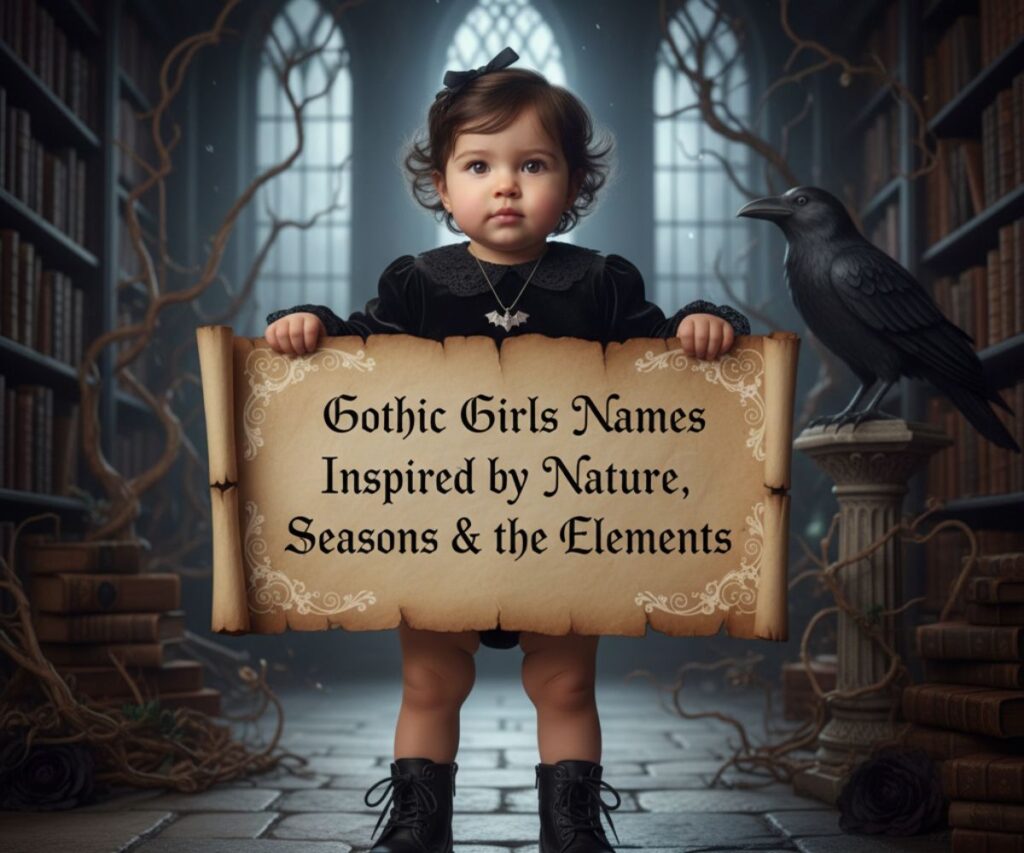
The natural world has a haunting side—one filled with stormy skies, thorn-covered forests, midnight creatures, and the quiet hush of winter landscapes. This section explores nature gothic names drawn from ravens, tempests, poisonous flowers, icy terrain, and nocturnal beings. These dark nature names carry an organic gothic beauty rooted in shadowy wilderness and the untamed elements. From windswept storms to moonlit birds, each name blends femininity with eerie elegance—perfect for parents, writers, and gothic creators seeking dark, aesthetic girl names shaped by nature’s most mysterious moods.
H3: Raven, Crow & Bird-Inspired Gothic Names
- Branwen (Welsh) – “Blessed raven”; powerful figure in Welsh mythology.
- Branwyn (Welsh) – Variant of Branwen; mystical, feminine, and nature-rooted.
- Corbaeu (French) – Means “raven”; dramatic and lyrical.
- Corbie (Scottish) – Cute yet gothic word for “crow.”
- Corva (Latin) – “Crow”; sharp, minimalist, dark nature symbolism.
- Corvina (Latin) – Elegant variation of “raven”; richly atmospheric.
- Kora (Greek origin) – Symbolic connection to the underworld and dark birds.
- Merle (French) – “Blackbird”; vintage and poetic.
- Orevah (Hebrew) – “Raven”; rare and atmospheric.
- Raven (English) – A modern, powerful gothic bird name.
- Ravenna (Italian) – Means “raven”; evokes gothic Italian architecture and Poe aesthetics.
- Ravna (Scandinavian) – Nordic raven name with cold, wild tones.
Storm, Weather & Elemental Dark Names
- Aella (Greek) – Means “whirlwind”; mythological warrior energy.
- Ash (English) – Symbol of rebirth and fire; minimalist and moody.
- Astra (Latin) – “Star”; cosmic, soft, and gothic.
- Astraea (Greek) – Star-maiden; tied to gothic celestial themes.
- Breeze (English) – Soft wind with dreamy, eerie undertones.
- Ember (English) – Dying fire glow; soft yet haunting.
- Gale (English) – “Strong wind”; simple and fierce.
- Haze (English) – Foggy, atmospheric, perfect for dark aesthetic.
- Hurricane (English) – Rare, powerful storm-inspired name.
- Lumia (Finnish) – “Snow”; elemental and soft.
- Sable (French) – Dark, shadowy, storm-like energy.
- Storm (English) – Strong, modern, bold elemental name.
- Tempest (English) – “Storm”; dramatic and Shakespearean.
- Vesper (Latin) – “Evening star”; twilight mysticism.
- Zephyrine (Greek) – Feminine form of Zephyr; “west wind,” airy and mystical.
Dark Floral & Botanical Gothic Names
- Amaranth – “Unfading”; mythic, immortal flower.
- Belladonna – Deadly nightshade; iconic poisonous gothic plant.
- Briar – Thorny and fairy-tale dark.
- Celandine – Medieval herbal name; witchy and rare.
- Hemlock – Poisonous herb with strong dark symbolism.
- Ivy – Ancient climbing plant tied to gothic ruins.
- Lunaria – “Moon seed”; soft and mystical.
- Mora – Means “blackberry”; dark natural sweetness.
- Narcissa – From narcissus; elegant and shadowy.
- Oleander – Elegant and toxic flowering plant.
- Poppy – Symbol of sleep, dream, and death.
- Rose (dark context) – Tragic romance in gothic symbolism.
- Rue – Herb tied to sorrow and remorse.
- Thistle – Fierce, prickly, distinctly gothic.
- Thorn – Sharp and perfectly gothic.
- Viola – Dark purple floral name with vintage charm.
- Wisteria – Dark romantic blooms in gothic gardens.
- Yarrow – Herb linked to protection and folklore.
H3: Winter, Frost & Cold-Inspired Names
- Eira (Welsh) – Means “snow”; soft yet powerful.
- Frostine – Frost-inspired, crystalline, whimsical.
- Glaciana – Fantasy-style name derived from “glacier.”
- Neve (Latin) – “Snow”; elegant and minimalist.
- Winter – Soft, crisp, atmospheric.
- Yuki (Japanese) – “Snow”; delicate and serene.
H3: Nocturnal Creature Names
- Chiroptera – Scientific name for bats; dark, aesthetic, unique.
- Luna – From the luna moth; tied to moon and mystery.
- Moth – Strange, delicate, drawn to moonlight and flame.
- Nightingale – Night singer with gothic romantic symbolism.
- Nyctea – Genus of snowy owls; rare and powerful.
- Wren – Small bird with nocturnal associations.
Vampire & Dark Fantasy Inspired Female Gothic Names
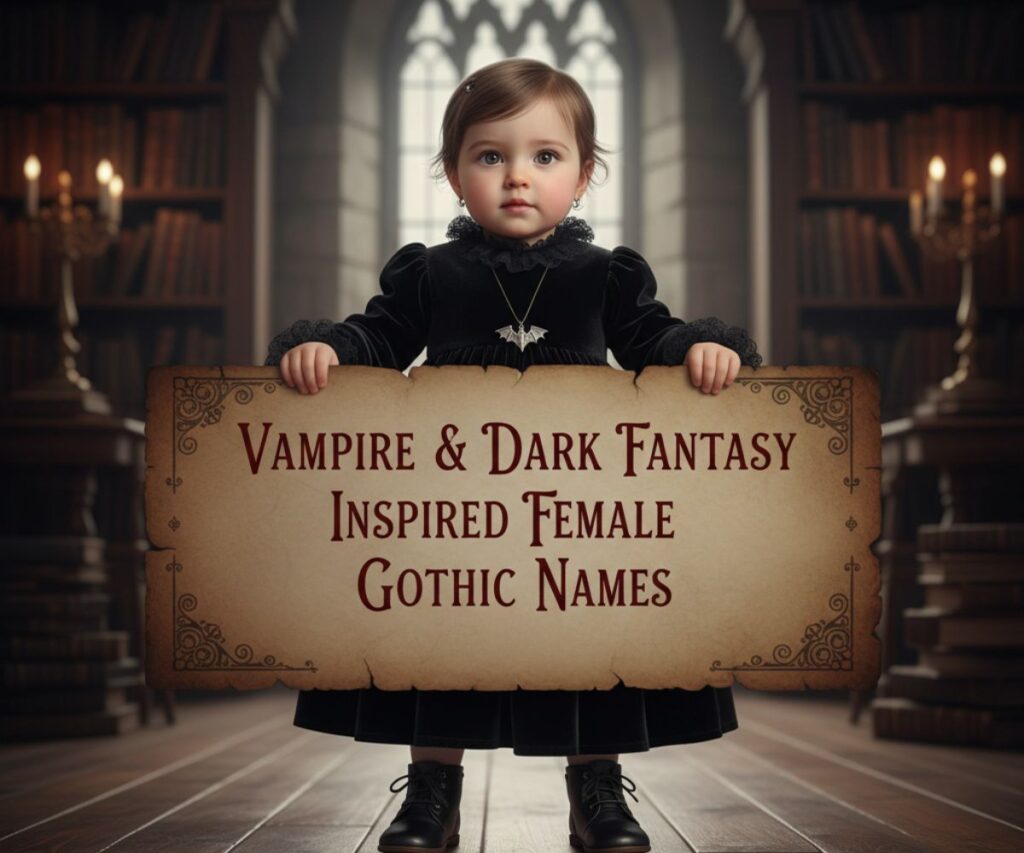
Vampires embody one of the most iconic gothic archetypes—creatures of immortal beauty, dark romance, and forbidden desire. This section explores powerful vampire names for girls inspired by literature, film, mythology, and aristocratic bloodlines. Whether you’re writing paranormal fiction, crafting dark fantasy worlds, developing dark fantasy character names, or building complex heroines for a supernatural romance novel, these names carry mystery, danger, seduction, and elegance. Each one blends ancient femininity with supernatural edge, offering female vampire names that feel immortal, enchanted, and deeply gothic. These gothic vampire girl names are perfect for authors, RPG creators, and anyone searching for atmospheric, vampiric character inspiration.
Names from Vampire Literature & Film
These timeless vampire-inspired names come from classic novels, gothic cinema, and paranormal storytellers:
- Akasha (Sanskrit) – “Ether”; the all-powerful vampire queen in Queen of the Damned.
- Carmilla (Irish) – Famous lesbian vampire from Le Fanu’s novella; seductive, predatory elegance.
- Claudia (Latin) – Eternal child vampire from Interview with the Vampire; deceptively innocent yet terrifying.
- Drusilla (Latin) – Whimsical, fragile yet brutal vampire from Buffy the Vampire Slayer.
- Elena (Greek) – Heroine-turned-vampire from The Vampire Diaries; emotional, luminous, tragic.
- Esme (French) – From Twilight; gentle, maternal, immortal.
- Irina (Russian) – Cold, elegant vampire name with icy undertones.
- Marishka (Slavic) – Bride of Dracula in Van Helsing.
- Miriam (Hebrew) – Ancient, glamorous vampire from The Hunger.
- Rebekah (Hebrew) – Original vampire from The Vampire Diaries; regal and ruthless.
- Rosalie (Latin) – Another Twilight vampire; beauty and tragic intensity.
- Santanico (Spanish) – Sensual vampire dancer from From Dusk Till Dawn.
- Selene (Greek) – Moon goddess and fierce vampire warrior from Underworld.
- Serana (Unknown) – Popular vampire heroine from Skyrim.
- Talia (Hebrew) – Used in multiple fantasy series; mysterious and ethereal.
Names Meaning “Blood,” “Immortal,” or “Eternal”
These immortal gothic names draw from meanings connected to eternity, blood, and everlasting presence:
- Aeterna – Latin for “eternal”; ethereal and elegant.
- Amara – Means “eternal,” “unfading”; perfect dark fantasy name.
- Azura – Associated with deep red hues and shadow magic.
- Crimsona – Deep-red inspired; romantic yet dangerous.
- Cruor – Latin for “raw blood”; powerful and severe.
- Evania – Meaning “gracious,” used in dark fiction for ghostly characters.
- Immoria – Invented name rooted in “immortal.”
- Morana – Slavic death goddess; icy and intimidating.
- Perpetua – Means “everlasting”; ideal for immortal beings.
- Sangria – Blood-red drink; symbolic blood-inspired name.
- Sanguina – Derived from “sanguine”; lush and vampiric.
- Vita – “Life”; ironic twist for undead characters.
Aristocratic Vampire Names (European Nobility Style)
These aristocratic vampire girl names evoke castles, ancient bloodlines, and gothic royalty:
• Anastasia (Greek) – Means “resurrection”; Romanov mystique with rebirth energy.
• Baroness – Aristocratic, authoritative, chilling.
• Contessa – Title name that radiates dark nobility.
• Duchess – Regal, commanding; perfect for gothic royalty.
• Erzsebet (Hungarian) – Linked to Elizabeth Báthory, the Blood Countess.
• Isolde – Celtic romance name with medieval, tragic beauty.
• Marceline – Vintage French name with vampiric, whimsical darkness.
• Seraphine – Dark angelic elegance with aristocratic softness.
• Vladimira (Slavic) – Feminine of Vladimir; Dracula-coded power.
Dark Romance & Paranormal Character Names
These names work beautifully for paranormal novels, vampire romances, and seductive fantasy heroines:
• Crimson – Classic blood, passion, and vampiric allure.
• Eclipse – Mysterious, celestial, supernatural.
• Nyxara – Night goddess energy with fantasy flair.
• Obsidia – Inspired by obsidian; sharp, dark, enchanting.
• Nocturna – Night-centered, dramatic, powerful.
• Ravenesse – Combines raven symbolism with gothic femininity.
• Sanguine – Blood-red optimism twisted into gothic elegance.
• Shadowlyn – Atmospheric and perfect for dark fantasy.
• Veloria – Velvety, feminine, shadow-coded.
• Vermillion – Deep red; lush, romantic, and intense.
Short & Unique Modern Female Gothic Names (Edgy, Minimalist Aesthetic)
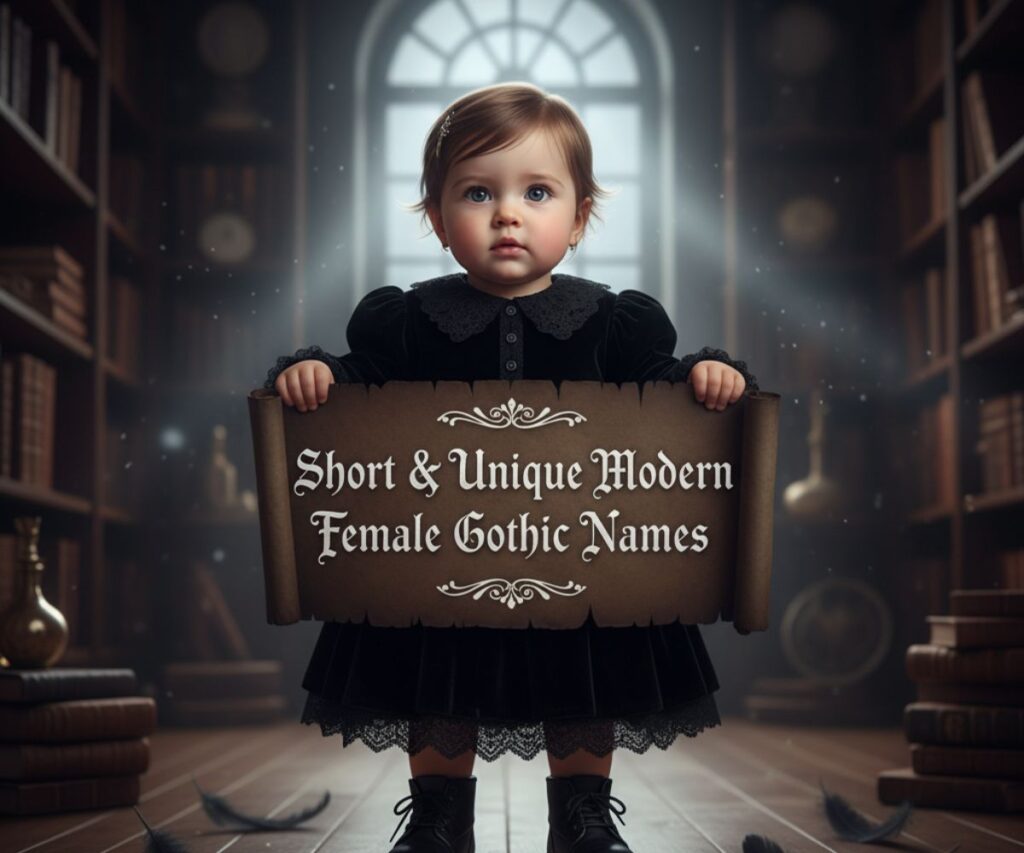
Modern naming trends are embracing a revival of unique gothic girl names that feel sharp, stylish, and effortlessly cool. Unlike traditional Victorian or mythological choices, today’s modern gothic names lean minimalist—favoring one-syllable edgy gothic names, elemental symbolism, and darkly poetic meanings. These names fit perfectly into contemporary storytelling, alternative fashion culture, and artistic identities. Whether you’re searching for short gothic names, writing modern dark feminine characters, or exploring minimalist gothic names with attitude, this curated list delivers bold, sleek, unforgettable options. Each name blends modern aesthetics with gothic undertones, creating a fusion of shadow, style, and personality.
One-Syllable Gothic Names
These minimalist gothic girl names pack intensity into just a few letters—perfect for modern fantasy characters, musicians, and alt personas:
- Ash (English) – “Ash tree; fire remains”; rebirth symbolism, neutral gothic edge.
- Blake – “Dark” or “pale”; versatile and edgy.
- Briar (English) – Thorn symbolism; soft yet dangerous.
- Crow – Corvid symbolism; stark and haunting.
- Faye (English) – “Fairy”; mystical, dark fae aesthetic.
- Hex – Witchcraft charm; short, punchy spell energy.
- Jet – Black gemstone; suave and sharp.
- Nox (Latin) – “Night”; fierce brevity with cosmic darkness.
- Roe – Simple, sleek, shadowy.
- Rune (Norse) – “Secret, mystery”; occult, witchy minimalism.
- Shade – Pure gothic atmosphere.
- Sloane – Modern chic with cool darkness.
- Snow – Cold whiteness with haunting serenity.
- Storm – Raw weather power; modern and cinematic.
- Thorn – Symbol of pain, protection, dark elegance.
- Vale – Valley of shadows; poetic melancholy.
- Veil – “Covering, concealment”; ethereal, ghost-soft.
- Vex (English) – “To annoy, trouble”; sharp, chaotic, ultra-modern.
- Wren (English) – Nocturnal energy; delicate but haunting.
Two-Syllable Modern Gothic Names
These options maintain a sleek, contemporary vibe while offering lyrical rhythm—great for modern gothic girl names with aesthetic flair:
- Echo (Greek) – Tragic nymph; haunting repetition and mythic sadness.
- Ember – Smoldering warmth; fiery gothic minimalism.
- Harlow – Modern celebrity edge; shadowy charm.
- Kaida – “Little dragon”; fierce but soft.
- Lilith – Iconic dark feminine name; rebellious and ancient.
- Luna (Latin) – Moon symbolism; beloved in modern gothic culture.
- Lyra – Star constellation; cosmic melody.
- Nova (Latin) – “New”; exploding star, cosmic power.
- Onyx (Greek) – “Claw”; black gemstone of protection.
- Orchid – Dark romance; exotic, mysterious flower.
- Raven – Core gothic symbol; sleek, seductive, intelligent.
- Sable (English) – Means “black”; luxurious and dark.
- Salem (Hebrew) – “Peace”; ironic witch-trial darkness.
- Vesper – “Evening star”; twilight mystique.
- Zara – Flashy, sharp, modern dark beauty.
Unique Invented Gothic Names
These invented modern gothic girl names are perfect for dark fantasy worlds, influencers, or creative personas:
• Darkling – “Little dark one”; whimsical shadow-energy.
• Elorae – Soft, ethereal, magic-touched.
• Gothica – Dramatic and unmistakably gothic.
• Lunaria – Moonlit botanical fantasy.
• Morvexa – Fierce, futuristic dark essence.
• Nyxia – Invented from “Nyx”; cosmic night-born.
• Ravynn – Stylish modern twist on “raven.”
• Vespera – “Evening”; lyrical, celestial darkness.
• Velvet – Decadent texture; rich gothic luxury.
• Zavira – Powerful, sleek, serpentlike sound.
Rare & Ancient Female Gothic Names for Deep Historical Mystique
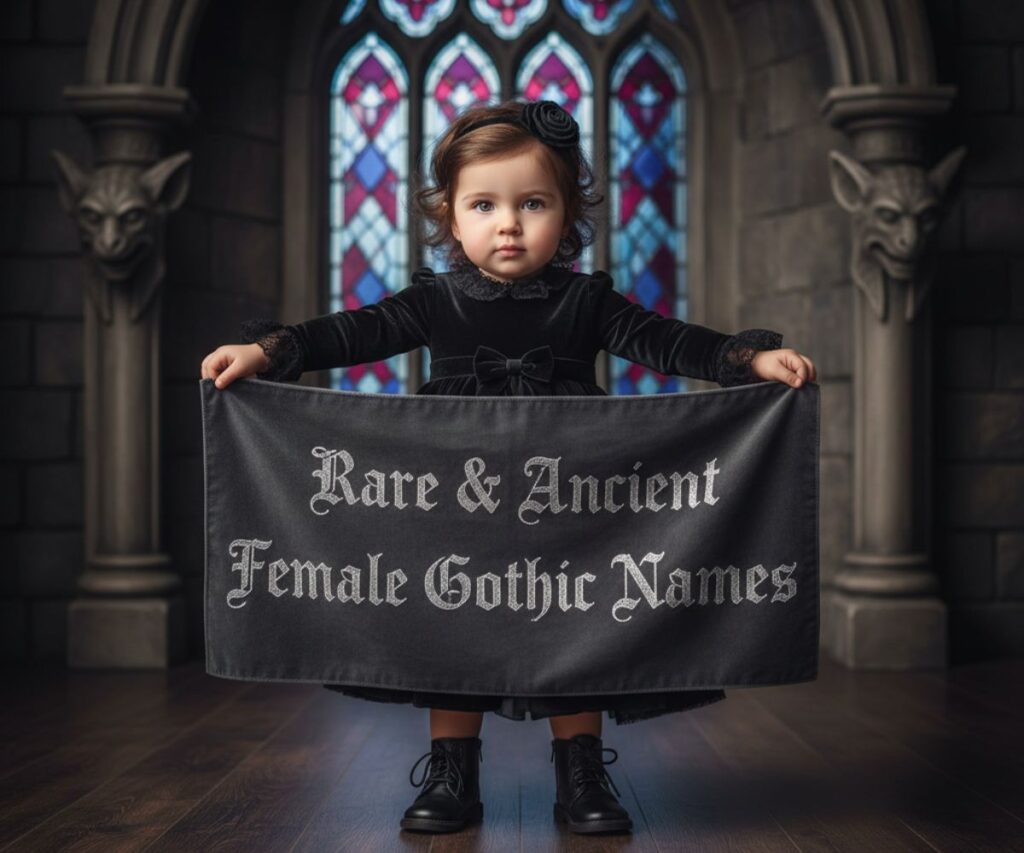
For seekers of rare gothic girl names, ancient gothic names, and historical dark feminine names, ancient and medieval naming traditions offer some of the most hauntingly beautiful choices. These names come from lost languages, medieval Europe, classical antiquity, and shadowed folklore, carrying themes of fate, tragedy, mysticism, and otherworldly depth. Whether you’re crafting dark fantasy characters, building gothic worlds, or searching for authentic historical gothic names, this curated list delivers atmospheric richness and old-world mystique.
Medieval European Gothic Names
These medieval gothic girl names carry tragic romance, mystical symbolism, and aristocratic melancholy:
- Aldara (Greek) – “Winged gift”; regal, mystical medieval rarity.
- Alienor (Old French) – Eleanor variant; medieval queens and tragic poems.
- Aveline (French/Germanic) – “Hazelnut”; soft yet noble Norman classic.
- Brangien (Celtic) – Companion of Isolde; tragic loyalty.
- Clarimond (French) – “Bright protector”; vampiric associations from medieval lore.
- Drusilla (Latin) – “Strong”; Roman-biblical origins with witchcraft undertones.
- Elswyth (Medieval) – “Elf strength”; magical medieval elegance.
- Griselda (Germanic) – “Gray battle”; iconic medieval folktale heroine.
- Gwendolen (Welsh) – “White ring/blessed ring”; Arthurian enchantment.
- Gwyneira (Welsh) – “White snow”; cold, ethereal beauty.
- Isolde (Germanic/Welsh) – “Ice battle”; tragic medieval romance.
- Jehanne (Medieval French) – Old form of Joan; mystical and saintly.
- Melusine (French legend) – Serpent-fairy spirit; core gothic romance archetype.
- Millicent (Germanic) – “Strong in work”; noble medieval courts.
- Odeline (French/Germanic) – “Wealth, fortune”; soft aristocratic darkness.
- Petronella (Latin) – “Rock”; medieval saint name with folkloric shadows.
- Sibilla (Latin/Occitan) – “Prophetess”; medieval mystic and oracle.
- Ysoria (Old French) – Rare medieval feminine name; mysterious origins.
Old English & Anglo-Saxon Gothic Names
Perfect for writers seeking ancient warrior names, Anglo-Saxon gothic girl names, and historical authenticity:
• Aelfthryth – “Elf power”; queenly and mystical.
• Beorhtwynn – “Bright joy”; paradoxical gothic contrast.
• Cynewise – “Royal woman”; sharp Anglo-Saxon authority.
• Eadgifu – “Wealth gift”; historical nobility.
• Eadlyn – “Noble waterfall”; gentle but powerful.
• Frithuswith – “Strong peace”; medieval saint with spiritual depth.
• Leofwyn – “Beloved joy”; rare ancient sweetness.
• Oswyn – “God’s friend”; solemn, old-world energy.
• Wulfhild – “Wolf battle”; fierce warrior femininity.
• Wynflæd – “Graceful beauty”; delicate yet ancient.
Ancient Greek & Latin Rarities
These ancient gothic girl names connect deeply with tragedy, mythology, and classical darkness:
• Agrippina (Latin) – Empress; power, ambition, manipulation.
• Antigone (Greek) – Tragic heroine who defied kings and fate.
• Cassia (Latin) – Cinnamon tree; ancient botanical elegance.
• Cressida (Greek) – Trojan romance, betrayal, tragic beauty.
• Eudora (Greek) – “Good gift”; soft but rare.
• Faustina (Latin) – Imperial luxury; destiny and decadence.
• Hypatia (Greek) – Philosopher; martyr of knowledge and truth.
• Lavinia (Latin) – Noble destiny; Aeneid heroine.
• Lucretia (Latin) – Roman tragedy; purity, sacrifice, political upheaval.
• Marcia (Latin) – “War-like”; strong ancient feminine energy.
Forgotten Gothic European Surnames as First Names
These gothic surnames radiate aristocratic, occult, and dark-fantasy energy—perfect for vampire names, gothic heroines, or elite dark worldbuilding:
• Ashmore – Ancient English; ash trees, old manors.
• Blackwell – “Dark water”; moody and noble.
• Darkholme – Dramatic, shadow-infused surname.
• Evernight – Invented surname; poetic eternal darkness.
• Mortimer – “Dead sea”; quintessential gothic surname.
• Ravenscroft – Classic gothic literature surname; elegant, ominous.
• Ravenswood – Corvid symbolism + gothic aristocracy.
• Thornhart – Fierce, medieval, symbolic.
How to Choose the Perfect Female Gothic Names for Your Daughter
Choosing the perfect gothic name requires thought and consideration. Here are a few tips to help you find the ideal one:
- Consider the Meaning: Choose a name with a meaning that resonates with you.
- Literary and Mythological Influence: Many gothic names are inspired by classic literature and mythology, offering both beauty and history.
- Think About the Sound: Make sure the name flows well with your last name.
- Personal Significance: Consider choosing a name that holds personal significance to you or your family.
- Elegance and Mystery: Look for names that are both beautiful and mysterious.
FAQ’s – Gothic Girl Names and More
What is a good female gothic name ?
A great gothic girl name could be Ophelia, which carries tragic beauty from literature, or Lydia, inspired by dark aesthetic culture. Other popular goth names for girls include Raven, Luna, and Scarlett for their mysterious and elegant appeal.
What is a dark female gothic name?
Dark female names like Lilith, symbolizing rebellion and strength, or Raven, representing mystery and shadow, perfectly capture gothic culture. Names such as Salem, Ophelia, and Morticia are popular dark girl names with powerful meanings and haunting beauty.
What is a spooky female gothic name?
Spooky girl names like Salem, evoking witch trials and mystery, or Annabelle, made famous by horror films, create a hauntingly beautiful vibe. Other creepy female names include Wednesday, Belladonna, and Raven for their eerie yet elegant sound.
What is the most female gothic name?
The most iconic goth name is Morticia, inspired by The Addams Family character known for dark elegance. Other ultimate gothic names include Raven, Lilith, and Wednesday for their association with gothic subculture and mysterious beauty.
What’s an aesthetic girl name?
Aesthetic girl names like Luna (moon), Aurora (dawn), and Celeste (heavenly) blend beauty with mystery. These Instagram-worthy names are visually appealing and emotionally evocative, perfect for dark academia and gothic aesthetic lovers.
What is a tough female name?
Strong female names with powerful meanings include Athena (warrior goddess), Raven (dark strength), and Storm (untamed power). These badass girl names feature strong consonants and derive from mythology, nature, or battle, representing resilience and independence.
If you’re interested in Dark Gothic Boy Names, be sure to check out our 150+ Dark Gothic Boy Names With Mysterious Meanings to explore more unique and dark options!
My name is Amanda Lee, and I’m passionate about the gothic lifestyle. I created GothicMood to share my love for dark fashion, beauty, and culture. Here I recommend gothic-inspired products, style tips, and ideas to help others embrace and express their unique gothic identity.

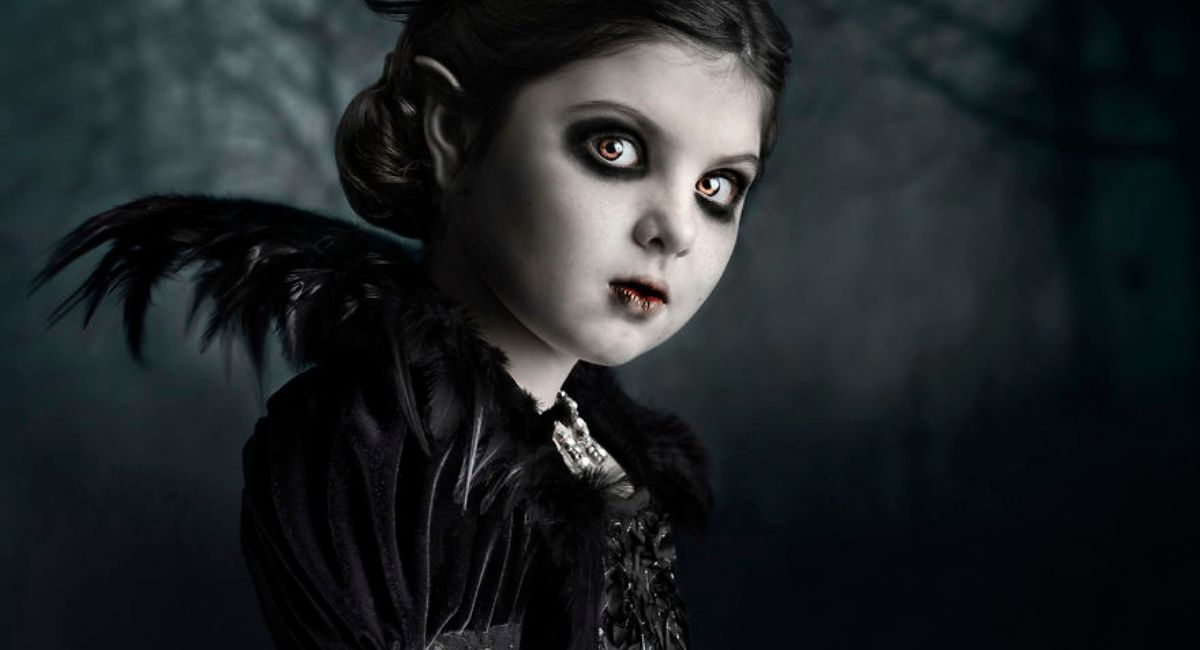
2 thoughts on “150+ Dark Elegant Female Gothic Names & Meanings”